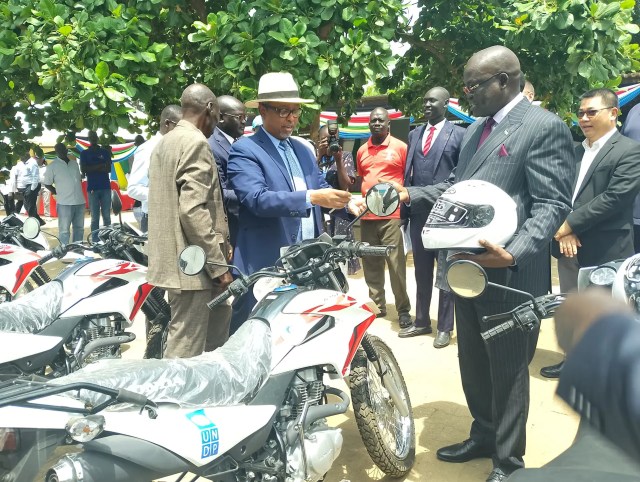Government and UNDP Launch Initiative to Empower Returnees with Brick-Making Machines and Motorcycles

In a significant step toward fostering sustainable reintegration, the Government of South Sudan, in partnership with the United Nations Development Programme (UNDP), has launched a support initiative providing 30 brick-making machines and nine motorcycles to aid returnees and communities across the country.
During the official handover ceremony in Juba, Minister of Humanitarian Affairs and Disaster Management, Hon. Albino Akol Atak, emphasized that the initiative marks a strategic shift from emergency aid toward long-term development.
“Today, we are not just receiving machines—we are investing in our people. This equipment will empower youth and returnees to become self-reliant, reduce dependency on humanitarian assistance, and foster community development,” he stated.
Hon. Akol praised UNDP’s role in supporting South Sudan’s national strategy for returns, reintegration, and recovery, noting that the tools will be deployed in regions with high concentrations of returnees to address urgent housing and income-generation needs.
“We want to move from emergency response to recovery, and ultimately to development. South Sudan must take charge of its future—empowering its citizens, especially the youth, with skills and opportunities,” he added.
“There is No Reintegration Without Housing,” says Hon. Stephen Kueth Gach
Chairperson of the Relief and Rehabilitation Commission (RRC), Hon. Stephen Kueth Gach, echoed the Minister’s sentiments, underscoring the critical role of housing in successful reintegration.
“There can be no reintegration without housing. Without a place to stay, individuals are likely to move again. That’s why this project by UNDP is so vital. The 30 brick-making machines will help our youth and returnees build homes and generate income,” he explained.
Hon. Kueth emphasized that reintegration efforts should be people-centered, focusing on creating sustainable livelihood opportunities.
“The most effective way to achieve durable solutions is by empowering people with the tools to transform their lives. With these machines and training, our returnees can rebuild stronger, more cohesive communities,” he said
He called for strong local government engagement, effective data coordination, and strategic use of the National Action Plan on Return, Reintegration, and Recovery to guide interventions.
UNDP Resident Representative in South Sudan, Dr. Mohammed Abchir, described the handover as more than just a transfer of equipment — it symbolizes renewed hope and shared commitment to sustainable development.
“This is not merely equipment; it’s a symbol of progress, hope, and our joint dedication to supporting displaced populations’ return and reintegration,” Dr. Abchir stated.
He highlighted that since April 2023, over 300,000 households have returned to South Sudan, underscoring the urgency of reintegration support.
“This initiative promotes dignity by enabling young people to acquire masonry and brick-making skills while constructing homes, schools, and infrastructure,”* he explained. *”The motorcycles will enhance RRC’s mobility in the field, strengthening data collection, coordination, and response efforts.”*
Dr. Abchir also pointed to UNDP’s broader portfolio, including predictive flood mapping, disaster early warning systems, and a centralized information portal, all aimed at improving national preparedness.
“Together, we can lay the foundation for a more resilient, inclusive, and prosperous South Sudan,” he concluded.
The 30 brick-making machines will be used for training and income-generating activities among returnees and youth in multiple states. The nine motorcycles will be deployed to RRC field offices to improve mobility, monitoring, and coordination.
This initiative aligns with the South Sudanese government’s strategy to localize humanitarian response and prioritize durable solutions—focusing on resilience, skills development, and community-driven recovery beyond emergency aid.




